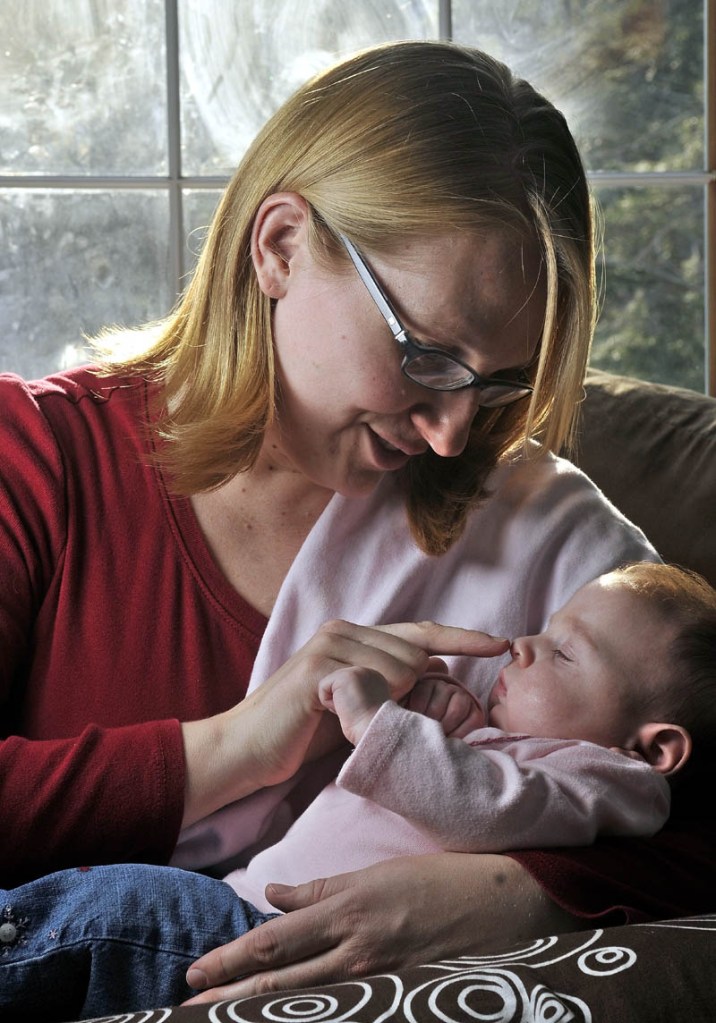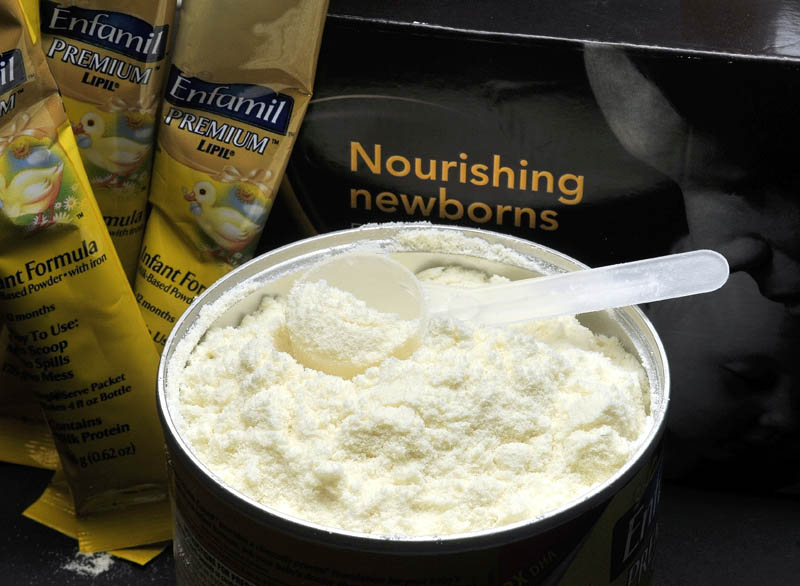Breast-feeding rates in Maine are keeping pace with the rest of the nation, but the state’s most vulnerable population stands in stark contrast.
A significant percentage of low-income mothers enrolled in the Maine Women, Infants, and Children Nutrition Program have chosen to feed their babies formula instead of breast milk, and the state spends more than $1.4 million a year to provide it to them, despite widespread education programs, financial incentives and strong evidence that breast milk is significantly healthier.
Also, Maine mothers are receiving large, unsolicited samples of infant formula through the mail, which some think could undermine the state’s educational efforts.
Cost of formula
The percentage of breast-fed babies in Maine is about even with the national average, according to statistics released last month from the U.S. Centers for Disease Control and Prevention. In two categories, Maine was ranked in the top 10. In one category, Maine is No. 1.
In 2012, 76 percent of Maine infants were breast-fed at least once. At six months of age, 41.5 percent still received breast milk along with other food sources. At 12 months, 23 percent were still receiving some breast milk.
“We’re doing really good here in the state of Maine with breast-feeding education and encouragement,” said Sheila Pinette, director of the Maine CDC.
Maine was ranked first in the nation for the number of births occurring at baby-friendly birthing centers, third in the nation for the number of board-certified lactation consultants and forth for the number of La Leche League leaders — a peer-to-peer support group for nursing mothers.
It’s a different story at the Maine WIC Nutrition Program, however.
Every month, the program provides $118,000 in cans of formula to mothers who qualify for benefits, said Director Lisa Hodgkins. In a year, that’s more than $1.4 million.
The program serves about 5,000 infants per month, 4,000 of whom are exclusively formula-fed. About 160 infants are fed a combination of breast milk and formula. About 1,000 infants — roughly 20 percent — are exclusively breast-fed.
Hodgkins said WIC promotes breast-feeding through counselors, nursing coaches and financial incentives. Breast-feeding mothers receive about $75 worth of food every month for a year through the program, while mothers who don’t breast-feed receive about $49 month for six months — a difference of $600.
“We encourage breast-feeding for a number of reasons. It’s better for the baby, it’s good for the mother-child bond, there are a lot of health benefits, and it’s cost-effective,” she said. “That’s our first conversation with folks that come to our program. If they say, ‘No, I can’t,’ or ‘I don’t want to,’ we do offer formula.”
Breast is best
There is little doubt breast milk is the healthiest choice for babies.
Reports from the American Academy of Pediatrics, the Surgeon General, the World Health Organization, UNICEF and many others all point to widespread benefits for baby, mother and society at large.
People who were exclusively breast-fed as infants are less likely to experience a host of ailments than their formula-fed counterparts, including ear infections, childhood leukemia, childhood obesity, allergies, diabetes and asthma.
Mothers who breast-feed for more than 12 months are at decreased risk for cardiovascular disease, diabetes, breast cancer, ovarian cancer and more.
There are economic effects, too. Mothers who favor breast-feeding over formula can save up to $1,500 a year, according to a report from the surgeon general. The United States could save $13 billion a year in health care costs if 90 percent of mothers breast-fed their babies exclusively for six months, according to a 2010 article in Pediatrics. The same practice would save more than 900 lives a year, mostly infants.
Pinette said there are several reasons why some mothers choose formula over breast milk.
Babies born prematurely may lack the ability to suckle, or they may be separated from their mothers during extended medical care. Older babies are generally extra hungry during growth spurts and can make mothers feel “like they don’t get a moment’s break,” Pinette said.
Sleep is also a factor. Breast-feeding babies nurse every two to three hours, while formula-fed babies eat less often — every four or five hours — which can lead to longer periods of uninterrupted sleep.
Returning to work after maternity leave causes many mothers to switch to formula. Breast-feeding also can be embarrassing for some, Pinette said.
The early days of breastfeeding can be especially difficult. Latching can be painful for the mother. There’s a possibility of infections, blisters and bites. Also, milk production doesn’t begin in earnest for about five days after delivery, so dehydration and weight loss are common in newborns. Babies also may cry a lot during this period, which can drive some mothers to try formula, Pinette said.
“Breast-feeding takes tremendous emotional maturity and commitment by the mom,” Pinette said. “If you get past the first six to eight weeks, most moms are really successful.”
Special delivery
Within days of arriving home from the hospital, many new mothers discover hefty packages on their doorsteps.
The packages are filled with baby formula, bottles, coupons and more, and are often unsolicited. A 2-pound box from Similac, for instance, holds two tubs of powdered formula, a 4-ounce baby bottle and $20 worth of store coupons for any Similac formula product. Enfamil sends similar packages.
State officials, health care workers and mothers aren’t sure how the formula companies obtain names and addresses of new mothers, and some wonder whether the packages undermine efforts to improve breast-feeding rates.
Michelle Trask is a mother of four living in Augusta. Shortly after her first child was born, she received an unsolicited sample of baby formula through the mail.
Trask, now 33, was planning to try breast-feeding, but wasn’t entirely sure.
“I was on the fence, and as soon as things started to get difficult, I hit the samples I had,” she recalled.
Trask’s first two children were formula-fed, but her third child flatly refused to feed from a bottle, so she switched to breast-feeding. At first it was challenging, but it got easier. When she had her fourth child in July, there was no question that she would breast-feed.
“This is this way to go. It’s so much easier for me in the night. I don’t have to wake up to make formula,” Trask said, “and it’s so much more cost-effective, obviously.”
Trask occasionally receives samples in the mail, which she gives to a friend who supplements breast-feeding with formula. She wonders, however, whether some new mothers might give up on breast-feeding when a free package of formula arrives.
“The first two weeks are always rough,” she said of breast-feeding. “If a mom isn’t very committed, then it (a sample package) could be enough to sway someone.”
Thomasina Hutchins is a mother of four in Winthrop. She used to receive formula packages in the mail, but hasn’t since the birth of her youngest child, a 3-month-old daughter. She’s not sure how her name got on a mailing list before or why she isn’t now, but she receives occasional packages from her friend Trask.
Hutchins, 33, said there was no way the free packages could have swayed her.
“I was pretty confident that I was going to breast-feed,” she said. “I was going to fight through and figure it out; but with all of them, including this new one, I ended up supplementing with formula.
“But if I were a nervous nursing mom or not completely comfortable with it, and I see that bottle of formula sitting there, one night when I’m having trouble feeding my baby, it would be a lot easier to just pick up the formula and give up breast-feeding.”
The World Health Organization and UNICEF have ardently opposed any marketing of baby formula. A 2001 report from WHO states that “infant formula should not be marketed or distributed in any environment that may interfere with the protection and promotion of breastfeeding.” A 2011 report from UNICEF calls for communities and health services to “counter the formula marketing with strong protection of breastfeeding.”
Christopher Perille, spokesman for Enfamil’s parent company, Mead Johnson, said the formula makers strive to create the healthiest possible product.
“Given the acknowledged benefits received by children who breastfeed, our research and development efforts are focused on making our infant formulas as close to breast milk as possible,” he wrote in an e-mail.
The company’s marketing strategy is in step with mothers’ needs, Perille wrote, citing a 2012 survey funded by the International Formula Council.
“We know that the overwhelming majority of mothers — regardless of whether they formula feed, breast feed or both — want the feeding support kits, including samples and nutrition information,” he wrote.
The survey, conducted by Greenberg Quinlan Rosner Research, also found that 71 percent of mothers already had decided how they would feed their babies before entering the hospital.
Perille said the company obtains a majority of its mailing addresses directly from mothers and referrals by friends and family. The rest are obtained through “on-line registration in infant-related programs, participation in baby registries, as well as purchased sources based on magazine subscriptions, catalogue orders, et cetera,” he wrote.
Lindsy Delco, a representative from Similac’s parent company, Abbott Nutrition, wouldn’t say how mailing lists are gathered.
“It is sensitive information we wouldn’t want our competitors to know,” she wrote in an e-mail.
Trask and Hutchins wonder whether formula companies receive addresses from hospitals, but that’s unlikely, said Joy Leach, a spokesperson for MaineGeneral Medical Center.
MaineGeneral doesn’t share patient information with marketing companies, and doing so could be a violation of federal health privacy laws.
“We are patient- and family-centered,” she said. “We do not share patient information.”
Leach said the hospitals in Augusta and Waterville have stopped promoting baby formula in any way, one of the requirements of the institution’s baby-friendly certification from Baby Friendly U.S.A. — a nonprofit group that bases its criteria on studies by the World Health Organization and UNICEF. MaineGeneral hospitals in Augusta and Waterville both have received the baby-friendly designation.
Hospitals with the designation provide information on the benefits of breast-feeding and do not advertise formula or provide sample packages of formula to new mothers. The hospitals will support any choice mothers make, however, whether it’s formula, breast milk or a combination, said Annette Bowman, director of maternal child health.
Pinette said free formula samples have been arriving at Maine homes for years, but it could be on the rise.
“People are trying to sell a product,” she said. “They’re going find any way to get new moms. They’re going to try to capture you, just like smoking.”
Staff writer Matt Hongoltz-Hetling contributed to this report.
Ben McCanna — 861-9239
bmccanna@centralmaine.com
Send questions/comments to the editors.




